
Our work, guided by our North Star and underpinned by racial justice, focuses on three interconnected dimensions: health justice, economic justice, and family autonomy.
Our work is both practical and aspirational. We take on strategic, immediate, and achievable policy changes that will benefit families today as we work toward more innovative and transformative policy shifts that promote the well-being of families over the long term and ensure they have control over the most important decisions in their lives. We do this by focusing on policies aimed at achieving economic and health justice, and promoting family support, dignity, and autonomy.
We must ensure that all young children and their families have the opportunity to be healthy and happy, participate fully in society, and pursue their goals. Doing so requires understanding the root causes of contemporary inequities and developing anti-racist family and early childhood policies that ensure all young children have what they need to grow and thrive in supportive communities.
Below are a few examples of how we execute our North Star vision.
Caregiving—in the formal care workforce and outside of it—can be deeply fulfilling work, but it also can be emotionally and physically difficult labor, and it can subject those who do it to severe economic insecurity and hardship. While some caregivers live with other wage earners and can share in the family’s income, many caregivers cannot or do not have adequate family income to meet their needs, and relying on family income as a source of support does not value the work they do.
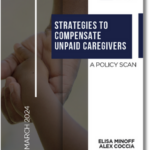 |
Strategies to Compensate Unpaid Caregivers: A Policy Scan Learn more about Strategies to Compensate Unpaid Caregivers: A Policy Scan here. |
Creating Actionable & Real Solutions (CARES)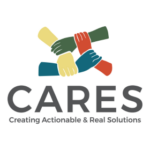
We are working to drastically change the systemic challenges that youth who are or have been involved with the foster care system experience.
On any given day in the United States, there are more than 400,000 children in the foster care system—and more than 82,000 are youth older than 14. These young people, specifically transition-age youth of color, are more likely to experience disparate treatment and outcomes. It is our belief that, with the right combination of innovation, authentic engagement of youth, and community collaboration, we can start to change that.
Learn more about our approach to the work here.
CARES Youth Ambassadors, selected in Los Angeles, CA; New York, NY; and Atlanta, GA (each of the cities in which we are conducting our work), function as advisors for this work. Below, find two examples of cornerstone work done in collaboration with CARES Ambassadors.
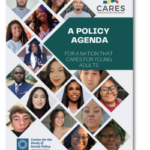 |
A Policy Agenda for a Nation that CARES for Young Adults Learn more about A Policy Agenda for a Nation that CARES for Young Adults here. |
|
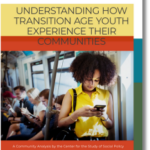 |
CARES: Understanding How Transition Age Youth Experience their Communities Learn more about CARES: Understanding How Transition Age Youth Experience their Communities here. |
Parent Leader Network
The EC-LINC Parent Leader Network (PLN) provides a space for parents in EC-LINC communities to collaborate with and support each other, represent the parent perspective, and advocate for parent voice and leadership in early childhood systems. We believe that:
- Parents should be at the center of the work of early childhood agencies and systems;
- Parents should be participating at all levels from planning to budgeting to decision-making;
- Parents should be valued as experts; and
- Parents should be powerful leaders in their communities and beyond.
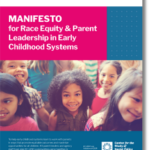 |
MANIFESTO for Race Equity & Parent Leadership in Early Childhood Systems Learn more about MANIFESTO for Race Equity & Parent Leadership in Early Childhood Systems here. |
Advancing an Anti-Racist Child Allowance
Our work is grounded in deep historical research that examines the ways in which policies and decisions have been built over time and how they continue to influence decisions and impact families in policy today. In addition to grounding our work in historical research, we center the experiences and needs of families through a combination of strategies including long-term collaboration and qualitative interviews and surveys. We believe that developing meaningful solutions can only be achieved if our policy work is driven by what families determine they need in ways that they determine work best.
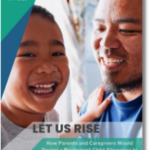 |
Let Us Rise: How Parents and Caregivers Would Design a Permanent Child Allowance to Advance Racial and Economic Justice Learn more about Let Us Rise: How Parents and Caregivers Would Design a Permanent Child Allowance to Advance Racial and Economic Justice here. |
|
 |
The Automatic Benefit for Children (ABC) Coalition |

Developmental Understanding and Legal Collaboration for Everyone (DULCE)
DULCE is an innovative approach based in the pediatric care setting that proactively addresses social determinants of health, promotes the healthy development of infants, and provides support to their parents, all during the precious and critical first six months of life.
DULCE does this by introducing a Family Specialist trained in child development, relational practice, and concrete support problem solving into the pediatric care team. Family Specialists attend well-child visits with families and providers. They get to know the families, provide peer support, and then work with the DULCE Interdisciplinary Team to connect families with resources and support.
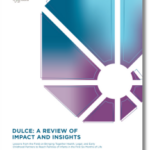 |
DULCE: A Review of Impacts and Insights Learn more about DULCE: A Review of Impacts and Insights |
|
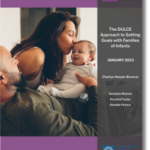 |
The DULCE Approach to Setting Goals with Families of Infants
CSSP engaged in a 12-month planning and implementation project focused on developing and pilot testing a collaborative goal setting process for families of infants that is derived from goal concordant care. This paper describes the initial success of this endeavor, including a description of and guidelines for the collaborative goal setting process, initial findings from pilot testing of the process, reflections about participants’ experience of the process, and a list of draft training and technical assistance tools. Learn more about The DULCE Approach to Setting Goals with Families of Infants here.
|